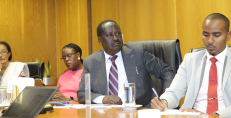Finding solutions for Africa’s energy sector

Johannesburg, February 19, 2019– Though considerable progress has been made recently in increasing energy generation in Africa, the continent still has about 580 million people in sub-Sahara who do not have access to electricity. Moreover, energy access is not even among African countries. On average it is about 40%, whereas some countries have energy access close to 100% while others have a very low access rate that even goes below 5%.
The 11thannual Africa Energy Indaba opened in Johannesburg, South Africa, at the Sandton Convention Centre on 19 February to address the above key issues, as well as how energy impacts the continent, in addition to finding solutions in the sector.
Some of the key speakers on the first day included South Africa’s Minister of Energy, Hon. Jeff Radebe, Hon. John-Peter Amewu, Minister of Energy in Ghana, Dr Ibrahim Mayaki, CEO of the African Union Development Agency (AUDA-NEPAD) and Dr Matar el Neyadi, Minister of Energy in the UAE.
“We are on the verge of an energy and technological revolution. The key is to avoid unintended consequences, be it economic, social or political,” the Energy Minister of Ghana, Hon. John Peter Amewu said.
Dr Mayaki spoke on Africa’s Agenda 2063 and the Africa Power vision, bringing to the fore the emphasis that the continent’s transformation agenda puts on access to reliable and affordable energy sources for the socioeconomic development of Africa.
“AUDA-NEPAD has been advocating and driving regional integration since it strongly believes that regional integration will provide an effective and efficient usage of Africa’s enormous energy resources, that span from considerable hydropower that amount to 12 % of the world reserves and mainly concentrated in central Africa, the massive coal reserves in Southern Africa, significant gas and oil reserves in eastern and north Africa, to mention but a few,” Dr Mayaki said.
The most effective means for the utilisation of such enormous resources is to think regionally where the most cost effective source of energy is first targeted for development with its benefits shared regionally. Regional integration is not only effective for the efficient utilisation of Africa vast energy resources but is instrumental in the provision of regional trade markets, job creation, peace and security.
Regional energy projects that AUDA-NEPAD is driving are well documented and described in the Programme for infrastructure Development in Africa known as PIDA. Regional projects are divided into short term, medium terms and long term up to year 2040. The short term projects include nine hydropower generation projects that will generate close to 16,000 MW.
In addition, AUDA-NEPAD is promoting an ambitious regional and continental power transmission programme. The main objective is to create an Integrated Continental Transmission Network, that links all the power utilities within each regional power pool and to interconnect all the regional power pools together. This will eventually lead to the creation of the largest energy market in Africa enabling energy to be sourced from the most competitive supplier within Africa.
The Africa Energy Inbaba saw delegates from around the world discuss business opportunities in the energy space, regional integration, innovative financing solutions, disruptive business models and ways to move to the private sector that will help with alternative power sources.



